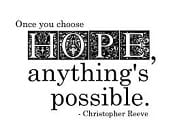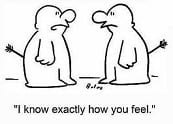“You gave me hope”
“You gave me hope,” Rhona said, “and that changed everything.”
Even by the standards of emotionally abusive relationships, Rhona has had it uber-tough.
She’s over 60, her husband is physically and emotionally abusive. He’s always controlled the ‘family’ purse-strings. He has a disease process going on which means he is wheel-chair-bound, and doubly incontinent. Rhona is going blind, but she’s her emotionally abusive husband’s full-time carer. They have no children. No money to speak of. If she leaves him she’s looking homelessness in the face. Her prospects of finding paid work, after years and years out of the work-force, aren’t brilliant.
Understandably, when Rhona became my client, she saw no future for herself, no way out of her predicament, and the profound despair she felt.
Our first scheduled call was one of those: “I don’t even know why I’m doing this” conversations that I often have with emotionally abused women. Rhona was firmly convinced that NOTHING in her life could change. The odds, as she saw it, were stacked against her.
I couldn’t deny that things did NOT look good.
I’ve spoken with emotionally abused clients who are independently wealthy, yet say it’s hard to leave, and it’s true.
It’s never easy to leave.
But Rhona’s story is one of exceptional difficulty.
Among the things that I’ve learned along the way, are these:
- There’s no earthly point in asking yourself: “How am I going to find a way out of this emotionally abusive relationship when I see no possible way out?” How questions like that serve only to distress and disempower you.
- Empathy is not support, and vice versa. What do I mean by that? When things are really tough, of course you want people to say: “I’m sorry it’s so hard for you, right now.” Empathy is decidedly better than unconcern – or being clever about someone else’s life – no doubt about it. But reminding you – and actually reinforcing – how bad things are for you doesn’t help. Honestly, it doesn’t help, at all. You might as well say: “Your situation is so, SO awful. I’m so sorry that you’re in that horrible, black hole. I feel for you, I really do. And I hear you are stuck, stuck, STUCK. But there’s obviously nothing that can be done, so let me help you to dig it deeper, and wider, so you have more room to stretch out in it. And for a little while I’ll be companionable and join you in it.”
My reply to Rhona was of the “Yes, and…” variety: “Yes, I understand that things are really impossible for you right now, and I could wish that they were different for you. You do NOT deserve to suffer. You’ve already suffered more than enough. So, let me ask you, respectfully and compassionately,what one thing can you do right now for yourself?”
Rhona was an emotionally abused woman in a black hole. But she wanted out.
She thought about it.
Then she told me exactly what that one thing was, and she took the decision to do it.
What happened next is an extraordinary chain of events, triggered by that one decision of hers.
In no way could I have predicted that that one act would have triggered the outcome that it has. All I knew was this: when you start to take action – whatever action you can take – then you start to unleash a magic you may not even believe exists for you.
Three months on, what has happened for Rhona?
First off, she’s unrecognisable. Rhona, now, constantly laughs and smiles. On our first call it had taken about 45 minutes to get a single, wan smile from her Now, she’s vibrant, upbeat, and… the best word to describe her is radiant.
She’s found a way out of her emotionally abusive marriage. Not only will her husband’s needs be well cared for – by other people – but her decision NOT to continue as before means she will be able to buy her own home. Her life is changing for the better beyond her wildest imaginings. She’s just finishing writing a book, and has backers who will help her get it out there. She’s happy and optimistic. She’s starting to believe in herself, and see her true worth.
She’s pretty excited about what lies ahead for her.
Go Rhona!
When I asked her what had changed with our first conversation, she said:
“You gave me hope.”
You see, it’s not really about how tough things are. All that truly matters is being able to look out of the black hole and see something better. Once you can do that, you can focus on it and start to move towards it.
I’ve seen it happen so very many times. These are the unsung miracles of recovery that I witness over and over again.
 For a lot of emotionally abused women, hope is the one thing that makes the difference between going down and staying afloat.
For a lot of emotionally abused women, hope is the one thing that makes the difference between going down and staying afloat.
Hope is the vehicle that will take you from the darkest places in your life to where you want to be.
If you can’t access that hope for yourself, then get help. Work with someone who can support you, and help you move swiftly forward. It will be worth your while.
Rhona did it.
You can, too.
Did you like this article? If so, click the Facebook “like” button below and share it with your friends.

Annie Kaszina, international Emotional Abuse Recovery specialist and award-winning author of 3 books designed to help women recognise and heal from toxic relationships so that they can build healthy, lasting relationships with the perfect partner for them, blogs about all aspects of abuse, understanding Narcissists and how to avoid them and building strong self-worth. To receive Annie’s blog direct to your Inbox just leave your details here.
The 5 Simple Steps to Healing from Narcissistic Abuse
Over the next 5 days, I'll send you some lessons and tips that I've found have really helped women to heal from narcissistic abuse. Starting with the basics.

